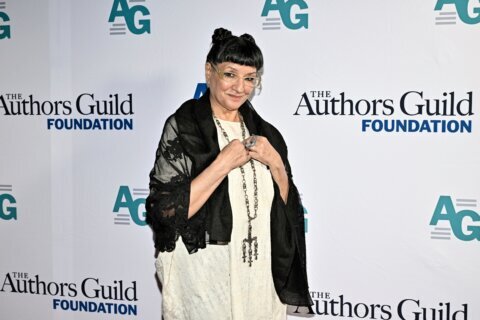WASHINGTON — Stop what you’re doing. Clear your calendar right now.
You officially have just one more week to get yourself down to the Southwest waterfront to witness one of the most timely, intense, thought-provoking post-9/11 plays to hit Arena Stage.
You’ll laugh. You’ll gasp. You’ll question your role in an increasingly complex world.
Prepare to be “Disgraced,” like the title of the 2013 Pulitzer Prize winner and 2015 Tony nominee.
“It’s the idea of dealing with … the things you’re not so proud of,” lead actor Nehal Joshi told WTOP. “Sometimes you have to destroy everything to make yourself new again. I think that’s hopeful. We’ve done that as Americans so many times and we’re a young country … That’s what the title means.”
Written by Ayad Akhtar and directed by Timothy Douglas, the single-location play follows Amir (Joshi), a Pakistani-American lawyer who gets in trouble with his predominantly Jewish law firm over his connections to a Muslim imam. His wife Emily (Ivy Vahanian) is a painter with an appreciation for Arabic art. Together, they share a Manhattan apartment with a view of One World Trade Center.
When Emily’s opinionated art-collector boss Isaac (Joe Isenberg) brings his wisecracking wife Jory (Felicia Curry) over for a dinner party, the booze-infused conversation quickly escalates into political conflicts and personal accusations as the 90-minute, no-intermission play reaches its crescendo.
“It’s a pressure cooker of a play. You can hear a pin drop,” said Joshi, who grew up in Burke, Virginia. “It sort of spirals out of control and turns into this rumination on ethnicity, faith and politics.”
One of the strengths of the play’s setup is how it flips our expectations. It’s Amir who rants about the danger of religious extremism, while it’s his white wife who finds beauty in Middle Eastern culture. As the story progresses, however, it weaves in a few stereotypes in order to explore larger themes.
“Some of the audience [members] get frustrated with what they perceive as a stereotype, and I can understand that,” Vahanian said. “But at the same time … you need to fill the envelope. You need to fulfill it in order to then get to the other side … They are archetypes to me, more so. You need a structure of these things that we can latch onto, to then bust it open. I think that’s what he’s doing.”
She is of course referring to Akhtar, who premiered the play in Chicago in 2012, winning the 2013 Pulitzer Prize for Drama, then hitting Broadway in 2014, where it earned a Tony nomination.
“I actually read his novel ‘American Dervish’ beforehand,” Vahanian said. “It really feels like a playwright who’s also searching for himself … It’s such an efficient script. It’s an incredible script.”
Not only is the script efficient, it’s also historically groundbreaking.
“It’s the most produced play in America right now and Ayad is only the third writer of color to hold that distinction,” Joshi said. “I think that’s a truly extraordinary thing for him. He’s an up-and-coming writer, so you’ll be hearing a lot more from him, which I think is incredibly exciting for theater.”
Audiences will find it refreshing and enlightening to hear from this new perspective.
“There was a 2010 Time magazine poll that 60 percent of Americans have never even met a Muslim. That’s an incredible stat,” Joshi said. “To deal with the fear that some people have toward Islam … coming to see our play, seeing a human character struggle with being American and trying to deal with the issues of Islam in America now, I think that’s an important thing for people to think about.”
The fear to which Joshi is referring no doubt stems from many Americans’ collective, subconscious PTSD from 9/11. After 15 years, the horrific dust is just now settling for Americans to process it.
“The Freedom Tower is on our set actually if you look out the window,” Joshi said. “9/11 still hangs very heavily over our culture. I think we’re just now — 15 years later — getting to a point where we can talk about it … It’s not as raw as it used to be, so now we can figure out how it all came together.”
When the lights go down at the end of the play, our initial reaction feels like a punch to the gut.
“You have the reaction, like you’re being slapped,” Vahanian said. “You react to it, and then maybe you step back and you have a little time. I think that’s what happens with this … You get to talk about it.”
After each show, Arena Stage hosts a nightly audience discussion in the lobby.
“We have a ‘talkback’ after every single show,” Vahanian said. “How affected they are really deeply and … how it makes them look at themselves in relation to what is [ingrained] in their bones.”
While the play is urgently topical, it has the wisdom of nuance so as to not feel like a partisan sermon.
“It’s not a preachy play,” Joshi said. “It’s not a morality lesson. It doesn’t shame you for feeling a certain way. In fact, depending on how you feel, it can actually affirm your feelings … You could see the play many times and have a completely different idea, which I think is really fascinating about it.”
This, folks, is the entire point of a venue like Arena Stage. Aptly named for its arena setting, it serves as not only a place for art and entertainment, but a town hall with a conversation we need to have.
“Arena [Stage] … the building they’ve built here on the waterfront is like a lighthouse,” Joshi said. “Because it’s one of the bigger theaters in town, it’s responsible for leading the entire community.”
Or, if you’re not so metaphorically inclined, think with your pocketbook.
“It’s easier to get a ticket to our show than ‘Hamilton,'” Joshi joked.
Listen below to the full interview with “Disgraced” stars Nehal Joshi and Ivy Vahanian:








